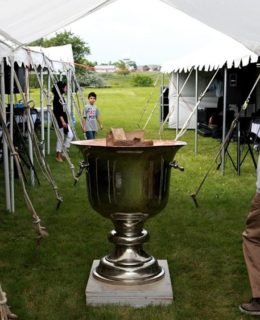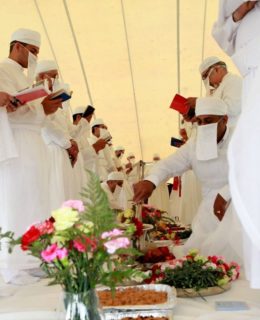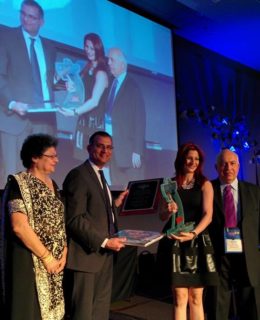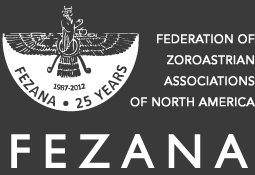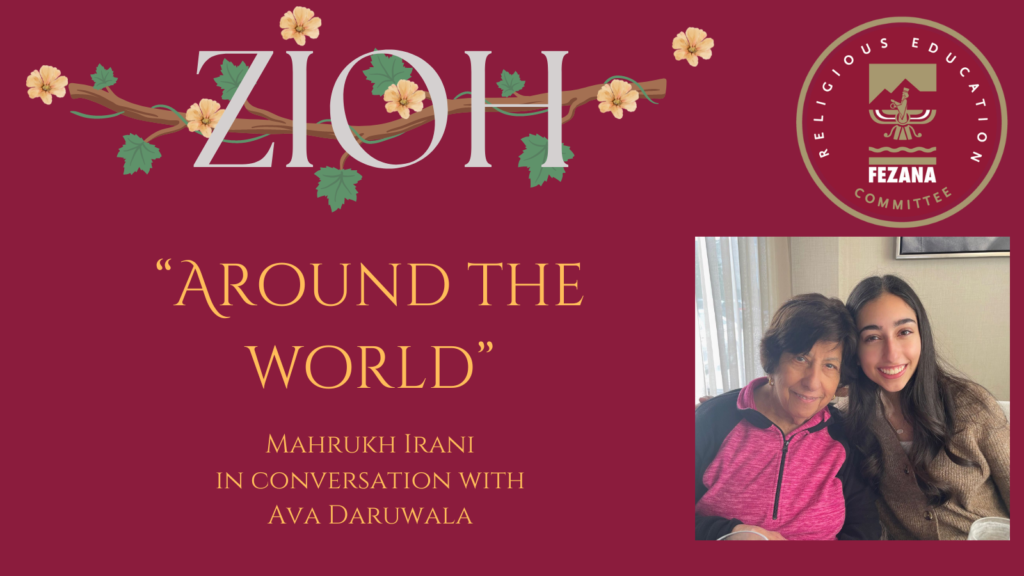
Youth: Ava Daruwala
Learning from the knowledge and experiences of our elders is important, because it’s more than stories, it’s about understanding where we come from and how it shapes who we are. I’m thankful for the opportunity to have oral documentation about my grandmother’s life experiences and to share it with others. I was happy to learn that she had a positive immigration experience and was able to establish a new home, strong sense of community, and religious connections in the U.S.
Participant: Maharukh Irani
This interview has been a great way to connect with my granddaughter, Ava. I am grateful for everything in my life and this has been an opportunity to think back on all that I have been through and share those experiences with her and others. I hope that future generations will be able to connect with my personal journey and remember to appreciate the lives that they have. And if my story can inspire even just one person to embrace their own journey and find gratitude in the little things, then it’s all worth it.
Around the World: An Interview with Maharukh Irani
Interviewer: Ava Daruwala
Date: 12.24.2023
00:00:00 Interviewer
So first I just want to say thank you for agreeing to do this interview with me, and it really means a lot that you’re able to share your story with all of us.
00:00:11 Narrator
Thank you for asking me to do it. I like it.
00:00:16 Interviewer
Okay, so let’s begin by talking a little bit about your childhood. Can you tell me where you were born, what your family was like, and what kind of education you received?
00:00:26 Narrator
I was born in India in the year 1944, when the British still ruled India, so we were part of the commonwealth and I grew up in the city of Bombay and I went to a parochial school. Most Parsis sent their children to those schools, which we in India used to call them convents. Now, convents doesn’t mean we lived there, but a convent was something that was siding with the Catholic religion. We had, at least I had, Irish nuns as teachers and Indian nuns. And we used to have 11 grades, not 12 like here. So I went to a parochial school, graduated from there. And we had two types of schools, one was SSC, which was the Indian school system and one was Cambridge, which was with England. I went to the Cambridge one and our curriculum came from England, from the town of Cambridge, which is where the university is, but this was at a high school level of ours. So did that, graduated, and then I did college, like a commerce kind of a thing. And then I went to work, I had a job in India.
Then, I love the girl guides and the Girl Scout movement. I was very interested in it and I joined that. My school did not have it, but another school, a Parsi school, had it. So I joined in their group and I did a lot of traveling and things with the Girl Guide Association. And there was a golden anniversary, a golden jubilee of the movement that came up, and they had a very big meeting in Japan. So, there were quite–I think we were like six or seven Parsi girls that were chosen to represent India, and we were all from Bombay, and we went to Japan. And I think it was like a week, one week or ten days or something like that, where we were introduced to their culture and we met with the then Princess Michiko and I think that time her husband was a crowned Prince. Later on she became Empress and he became Emperor. But at that time, she was still a Princess. And we were there in 1970 and they had the big, very beautiful Expo, World Expo in Japan, so we were very lucky to even visit that part and see. And then we got to spend basically about four or five days with a family, so another Parsi girl and myself, we were with the family. And it was a very lovely family and I think the gentleman, the father, we had to call him Papa San, and so he was something in I think the car industry or something because they were driving the latest and the greatest cars. Anyway, it was a very fun time and we came back to India.
And what happened after that–after that I got married, I got married in 1971. And my husband, at that time when we got married, he had at that time a job in Iran because the king of Iran, the Shah, had come to India at that time and he saw that there were many young kids out of college who did not have a job. So, in association with the Iranian Cultural Association there was–he put the offer that all Iranians, all Parsis, I mean, all the Zoroastrians were welcome because we were the original people living in Iran. So he said that country was open to having us there and he offered us jobs. So Bejan, my husband, went to Iran and along with I think 15/16 other people from Bombay and that’s where he was working. So he was already working there when I got married, so he came to India and then I went to Iran.
That was a little bit of a cultural shock to me because I did not know the language and everything was in Farsi. Everything. The TV, the news, the people, the writing, everything. And it was difficult, very difficult for me and we met one Zoroastrian family out there. And the other Parsis, or the other ones we could talk to, you know, because of the language barrier. My landlady had six or seven children, I’m not quite sure I forgot it, and she would talk to them and I would listen, and she would say follow along. That way, I basically learned the language by total immersion, living with that family in the same building. And I got to a point where I had really mastered the language, so much so that when I moved to Tehran from Isfahan I used to do translations for my boss. He was a German/Swiss–I don’t know, he had so many passports I cannot keep pace with it. But– so, I spent six years basically in Iran.
When we were in Isfahan, we did travel a lot around and I saw quite a few things there. Outside of Isfahan, which at that time was not such a big– it was a tourist attraction, but not as big as it is now. I saw the ruins of a fire temple and you could make out that it was a fire temple at one point, but apparently it had crumbled and it was ruined and there were many other places where you could see that there was a touch of Zoroastrianism in those ruins.
We traveled a lot in Iran, not as much as I would have loved to, but we went and visited Pir-e-Sabz, which is a place people go on pilgrimage. It has something that would – there’s a story if you could look it up. And from there we visited a little village called Cham. I mean, and those people were still– you could think they were still in the olden days. They were very leery of meeting with strangers. They would look at us and the little old lady would sit. They had little, very poorly built houses or mud cottages or something. And there also, I saw a lot of things that impressed me about Zoroastrianism: that they had kept their religion alive against all odds. That means that they still had a fire burning in a local, it was a little house, very nondescript. You never would make out that there was like a little agiary inside or a little place of worship. But we stayed with the Dustur and he showed us where he would go and keep the fire burning under– it was covered up in a lot of ash, so even if somebody came, they would not know what was going on. And right outside that place where he lived and the little fire temple was– was a tree. They think it’s a blessed tree, I don’t know, don’t quite know the name of the tree, but it never would die down. Any weather, any season, the tree was always green. And it had a lot of desert around it, but it was still flourishing. Then we saw that and we stayed with them in a little house where one room was occupied, but all of us were sleeping on the floor and the other room was the cattle where we had to go and, you know, do whatever you wanted to do and get out of the house because there was no other bathrooms out there. So next door with the cattle and we spent a couple of days, nights there. It was very touching to see how people had lived and they were still living, some of them. The older people would sit out and look at you like “you have come from where?”
And then I think from that, from Cham, we visited the Appadana, which was where King Cyrus had his palace. And we went to that and–who is it–Alexander and his army had come and set fire to it and burnt everything to the ground. So, all you can see are the pillars of the standing, the glory of the palace was, of course, long gone. And then right outside there, the palace area, there was a little tomb. It was Cyrus the Great, his tomb. It was a little hilly, like a little mound and a little message that says “please let me rest here in peace in this little piece of land”. So Cyrus apparently paid, so, no–what was his name–Alexander at least let the tomb be. He did not destroy the tomb because he says let it be, let it be so it still stands the tomb of Cyrus the Great out there, the very nondescript for a great man who did so much. I enjoyed living there in Iran, once I got the hang of the language, it was very beautiful, very nice and people were just great.
After that we immigrated. So when we immigrated, we landed in Chicago. And Chicago was–my brother who lived there. So we came as immigrants, literally 2 suitcases and nothing else to our name. And we have achieved what we would call the ‘American dream’. You work and you can make it here. So we came and then we had no job. It was the middle of winter, bitter winter 1977 was a blizzard. And my poor husband would walk trying to go to the library through all that and see if he could find a job, and he did find a job, except it was like 200 miles south from where we were in the US, in Chicago. So we went there, it was nice. It was a small town, so people from Bombay like me, you know, it’s like, oh, it’s a small town. I like cities. And there he got a job and he worked for Caterpillar, which is a big company. And that was the world headquarters of Caterpillar. And the children, my son was born there, my daughter was born in Bombay and we made good friends out there. The children started school and it was a nice little town and I made the best friends out there. They were good, kind people. I had never expected anything other than that and there was nothing racist or anything against us. Everyone was willing to help you, be good to you. It had small town values and such.
00:14:36 Interviewer
Did you connect with other Zoroastrians when you arrived?
00:14:40 Narrator
Well, my brother was there, and then he took us to a couple of meetings. That time there was no Darbe Mehr. They used to meet in either some people’s houses or there was a church where they would rent the hall and have a meeting maybe once a month or whatever, I don’t know. So we must have met them maybe two or three times. After that we moved to Peoria (Illinois). where there were no Parsis, not that I knew of. Later on, I think years later I found there was one girl who was there, who was a Parsi, but other than that, no, there were not too many Parsis in any of those places.
00:15:20 Interviewer
Well, because there were not as many Zoroastrians as you previously had in your–like in the other places that you had lived, how have you strived to preserve your Zoroastrian culture while trying to connect with new cultures?
00:15:36 Narrator
Well, the way it was instilled in me, while I was growing up, you know the prayers and everything, I taught and passed it down to my children and made sure that they followed it. But there was no one else where they could compare notes and say what is this and what is that. So we used to make trips to Chicago once in a while and beyond that, I don’t think the children were opened to meeting too many people in Peoria. So, that all came about once my daughter graduated and she moved to Chicago and then we started visiting Chicago much more and including ourselves in some of the functions they would have here. And my son went off to college in Colorado, then he moved there. So we are now in three places: Chicago, Colorado, and right here; or two places. Between, we traveled a lot, I traveled quite a bit.
My parents, when I was growing up too, my dad worked in the Merchant Navy. He was the chief engineer, so we were very, very lucky to visit London for the coronation of Queen Elizabeth the second. And although it was the usual, you know, damp, London weather, we had very good friends in London, so we went to their house and we saw the entire coronation on TV, which at that point was the first time they had ever done something like that completely on TV. The Queen’s husband said he would like it done and she agreed with him and that’s how they did it. So we did that and we saw the coronation.
And we went and–what else did we see? I think at that time they just opened up the Suez Canal, which was another marvel of engineering, so we went through that, the Suez Canal, and I don’t know what else we did there. Oh, and then after that, for our 25th wedding anniversary, my husband and myself went to the Middle East, where I had taken a class in–we were offered different kinds of things for senior Cambridge so I had taken a class called Scripture which encompassed the Christian religion, the Roman Catholic, and we got to go to Jerusalem, Bethlehem, where he was born. They showed where they have a little star embedded in the floor and they had that place where you can see where he went up the steps to where he was martyred up and there was that. And what else did I do? I had– I had a very, very interesting visit to Israel and Egypt from there.
00:19:08 Interviewer
What comes to mind when you hear the word home? Would you consider the US to be your home, and if so, how long has it taken you to feel like you are at home in this country?
00:19:21 Narrator
Well my parents were in India, so there was a pulling of my heart strings that they are there and I’m here. And I think we’ve now lived here since 1977. So, ‘77 to now it’s been close to what, 50, 44 something years? 44-45 years. And we were welcomed very warmly to the country. It’s very different from what people are, you know, seeing nowadays, that whether you come into the country and they look at you or something. But we had a beautiful experience. We were greeted at the airport in O’Hare by the authorities and they said, “Please come here,” and we sat down there and they took our pictures and they handed us a green card right there and then. And said “Welcome, welcome, we love you here” or something. It was a very, very warm welcome. And then, we stayed here, as I said, to look for a job and then we found it in Peoria, so we moved there. In Iran there were some places that you had to go and see, which I was fortunate to go there, but it was called Pir-e Sabz, which was a story of a king, a Zoroastrian king and his daughter and the Muslims attacked the Arabs. And she had to flee on a horse, so she got on the horse and started riding. And they were chasing her and chasing her. And finally she said, she asked, please, God, open up something like that so I can lose them. Right in front of her there was a little hilly, mountainous thing. The mountain opened up, and she and the horse went right through it and the mountain closed, but as the mountain closed a piece of her clothing got caught in it, so for many years they used to see that piece of clothing out there. Now, I don’t know how many years or how long or what, but that’s what it was. And right there, there is. It’s a desert and there was a beautiful little waterfall and greenery so that Pir-e Sabz is something like a Saint and many people go there. And they also showed where the Zoroastrians lived in the mountains, like in little cave-like things. So you know, you see these things and it touches you to see how far back your religion has come from and what you are experiencing out there.
00:22:11 Interviewer
So on that same note, do you think if you had stayed in Iran or India your kids would have learned more about the Zoroastrian religion?
00:22:22 Narrator
No, not necessarily, because there are so many people here in the U.S., all the Dusturjis and people who are scholars, they write books and we have get-togethers once a year. I think when they have the mobeds come and talk about the religion. So no, we are not missing out much because what you can learn here is just as good as if we were still in India.
00:22:52 Interviewer
One of the greatest challenges as a community today is to encourage young individuals like me to view their Zoroastrian self as integral to who they are. So, do you have any suggestions for families on how they can assist young children in making this important realization as they explore their identities?
00:23:13 Narrator
Well, as I said, when we were in Peoria, we had nothing to fall back on for my children to learn. In here, Chicago, the Darbe Mehr runs an excellent, excellent program with children’s religion classes, which I wish was there when we were here with the younger kids of ours. But my grandchildren have learned so much by going to the ZAC (Zoroastrian Association of Chicago) classes and so if everyone, you know, follows it and takes great joy and helps out, I think we can do very well for our new generation.
00:23:51 Interviewer
How important is Zoroastrianism in your daily life?
00:23:56 Narrator
Well, I pray a lot. That’s one thing about me. I pray a lot and I’ve taught my children the regular prayers. I know they may not pray three or four times a day, but I think they still follow most of the tenets of the religion and try and instill them. Just do three things: good thoughts, good words and good deeds, and you’ll be fine.
00:24:22 Interviewer
And then do you have any advice for future generations of Zoroastrians looking to move to the US?
00:24:30 Narrator
Be proud of your religion. Many people don’t know what our religion is and what it stands for, and I have so many friends who took great interest when I told them I was a Zoroastrian and said, “What is that?” and so I would explain and people like to hear about it. And they say, “Oh, thank you for telling us something about it.” And the other thing that is when Christmas comes around we are reminded that the three wise men who came from Asia across the mountains were three Zoroastrian priests. The three wise men were three Zoroastrian priests, and that’s what they were. They came, they saw the star, followed it, and it led them to where Jesus was born. So, there is some continuity between the two religions. And they’re very happy to know that we did this and we came and we, you know, met with so many people and I explain things to them. So they see what our religion is all about. There is not any kind of involvement in seeing how many people we can convert or anything, we don’t do that. We just like to live and let live.
00:25:52 Interviewer
And what role did the Zoroastrian Association play in your adjustment in this country?
00:26:03 Narrator
We were not in touch with the Zoroastrian association. As I said, we were in Peoria, so there was nothing, there was nobody there. So whatever we’ve learned now is very nice, it’s very good to mix and mingle with people and knowing we have the same culture, same prayers. So we try and keep pace with it, everything that is offered at the ZAC.
00:26:24 Interviewer
Do you still maintain ties with people back in your native country?
00:26:29 Narrator
Yes, yes, everything from my school, to college, to my office people in India, in Peoria, yes, I keep in touch with everyone I can.
00:26:47 Interviewer
Do you have anything more to share that I may have missed out upon asking you about?
00:26:54 Narrator
I mean, if anyone’s interested, if they look, go back and look at the 2500 years of the Pahlavi Realm in Iran, every person and lots of people and all the kings and queens came to Iran for their 2500 year celebration and they did a lot to show and showcase the background of the community there, how people lived, how they came about. It’s a beautiful country and except at this point I don’t think we can visit, that’s sad.
00:27:34 Interviewer
Yeah. Do you have anything else to share?
00:27:40 Narrator
Oh, I consider myself blessed. I’ve got lots of friends, lots of family, lots of friends here also. And we like it here and we are glad to visit India once in a while when the parents were there and now I don’t go that much. And we have been very blessed with everybody good. We’ve never had anything bad happen or anything racist against the religion or us as Parsis. Nothing. Everything is good.
00:28:09 Interviewer
That’s good. Well, thank you so much for doing this interview with me and I really appreciate the time that you took to do this with me.
00:28:18 Narrator
Thank you dear.

